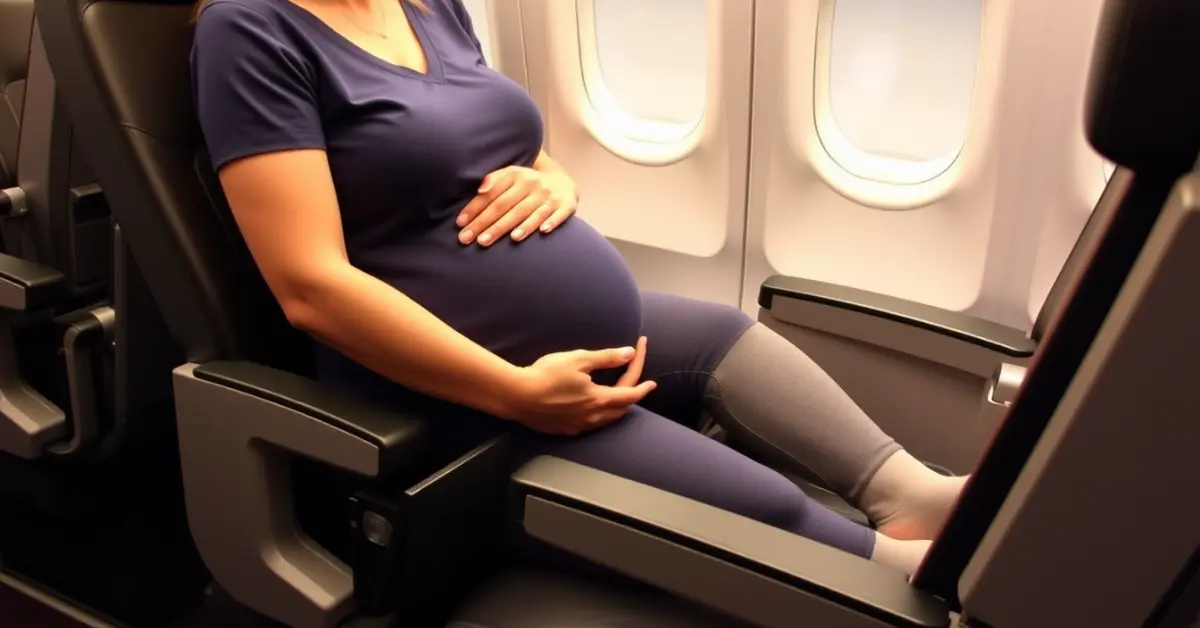Fit to Fly Certificate for Pregnancy
We are committed to providing you with convenient online Fit to Fly certificates for pregnancy without the need for a clinic visit.
Anytime Clinic offers easy access to Fit to Fly certificates specifically designed for expectant mothers, ensuring safe travel during pregnancy.
Through a quick online consultation, users can receive GP-reviewed documentation, often within the same day. This certificate confirms your fitness to travel by air while pregnant, providing peace of mind for both you and the airline.
LET'S GET STARTED


How it Works

01
Complete online consultation
No appointment required – simply complete a medical consultation form and upload a 30 second video of your symptoms or other medical evidence. Your e-consultation will then be sent directly to a GP for review.

02
Doctor Reviews Case & Evidence
One of our FCDO and GMC registered GPs will review and validate the submitted medical evidence and health information.

03
Receive your certificate
Receive your medical certificate or doctor's note as soon as same day or next working day, straight to your inbox.
LET'S GET STARTED
Frequently
Asked Questions
When do I need a fit to fly certificate during pregnancy?
Most airlines require a fit to fly certificate from 28 weeks of pregnancy onwards. Additional medical clearance may be needed between 32-36 weeks. Airlines typically don’t allow travel beyond 36 weeks for single pregnancies and 32 weeks for multiple pregnancies.
Who can issue a fit to fly certificate?
Only GMC-registered doctors can issue fit to fly certificates. Midwives, despite their expertise in pregnancy care, are not authorised to issue these certificates. You can obtain one through private GP clinics, travel health centres, or online medical services.
How much does a fit to fly certificate cost?
The cost typically ranges from £20 to £60, depending on the healthcare provider and the type of service (in-person or online consultation). Some travel insurance policies may cover this cost, so it’s worth checking your policy details.
How long is a fit to fly certificate valid?
The validity period varies by airline. For example, Jet2 requires certificates to be signed within 7 days of departure, with return journey documentation valid for 16 days. Always check your specific airline’s requirements, as policies can differ significantly.
What medical documents are needed for the certificate?
You’ll need to provide confirmation of your due date, recent ultrasound reports, antenatal records, and a current medication list. The certificate must include a doctor’s signature, official letterhead, current date stamp, and details of any pregnancy complications.
Is it safe to fly during the first trimester?
Flying during the first trimester (up to 12 weeks) generally presents minimal complications. Airlines don’t require a fit to fly certificate during this period, though you should carry routine pregnancy documentation. Always consult your healthcare provider before travel.
What’s the best time during pregnancy to fly?
The second trimester (weeks 13-28) is considered the safest time for air travel. Morning sickness usually subsides by then, and the risk of pregnancy-related complications is lower. Most airlines allow travel without special certification during this period.
Do I need special travel insurance when flying pregnant?
Yes, it’s highly recommended. Standard travel insurance typically covers pregnancy-related emergencies up to 28 weeks. After that, you’ll need special pregnancy coverage for complications, emergency medical evacuation, and trip cancellations.

Travelling while pregnant brings unique challenges and important considerations. We understand the anxiety many expectant mothers feel when planning air travel especially about airline requirements and safety measures.
A fit to fly certificate during pregnancy is crucial documentation that airlines require to ensure safe travel for both mother and baby. We’ll guide you through everything you need to know about obtaining this essential medical clearance whether you’re in your first trimester or approaching your due date.
From airline-specific regulations to medical requirements we’ve gathered expert insights to help make your journey as smooth as possible. Because every pregnancy is different it’s vital to understand when and why you’ll need this certificate before taking to the skies.
Key Takeaways:
- A fit to fly certificate is a mandatory medical document for pregnant travellers, typically required by airlines after 28 weeks of pregnancy
- Most UK airlines permit travel until 36 weeks for single pregnancies and 32 weeks for multiple pregnancies, with certification required from 28 weeks onwards
- Only GMC-registered doctors can issue fit to fly certificates, which cost between £20-£60, and must include official letterhead, current date stamps and pregnancy details
- The second trimester (13-28 weeks) is considered the safest period for air travel, with fewer restrictions and documentation requirements
- Airlines require specific medical documentation, including original certificates with doctor’s signatures, pregnancy stage details and GMC registration numbers
- Comprehensive travel insurance and supporting medical records are essential, with policies typically covering pregnancy-related emergencies up to 28 weeks gestation
What Is a Fit to Fly Certificate for Pregnancy
A Fit to Fly Certificate serves as an official medical document confirming the safety of air travel for pregnant women. It’s issued by GMC-registered doctors who assess both maternal and foetal health conditions to ensure safe travel.
Medical Requirements for Certification
Medical professionals evaluate several key factors before issuing a fit to fly certificate:
- Current stage of pregnancy
- Overall health condition
- Blood pressure readings
- Pregnancy-related complications
- Recent medical history
Documentation requirements include:
- Accurate due date confirmation
- Recent ultrasound reports
- Antenatal records
- Current medication list
When You Need to Obtain One
The timing for obtaining a fit to fly certificate depends on specific circumstances:
| Pregnancy Type | Maximum Travel Week | Certificate Requirement |
|---|---|---|
| Single | 36 weeks | From 28 weeks onwards |
| Multiple | 32 weeks | From 28 weeks onwards |
Airlines require certificates at different stages:
- 28-32 weeks: Most airlines request certification
- 32-36 weeks: Additional medical clearance needed
- Beyond 36 weeks: Travel restricted by most carriers
- Return flights within 7 days
- One-way journeys within 24 hours
- Multiple flights within the specified timeframe
How to Get a Pregnancy Fit to Fly Certificate
Obtaining a pregnancy fit to fly certificate involves a straightforward process of medical assessment and documentation. The certificate confirms your fitness for air travel during pregnancy through official medical channels.
Required Medical Examinations
A comprehensive medical examination forms the core requirement for a pregnancy fit to fly certificate. The doctor examines blood pressure readings, current stage of pregnancy and any pregnancy related complications.
Medical professionals evaluate these specific aspects:
- Current gestation period
- Blood pressure measurements
- Recent ultrasound results
- Overall maternal health status
- Any existing pregnancy complications
Where to Obtain Certification
GMC registered doctors provide official pregnancy fit to fly certificates through several channels:
- Private GP clinics
- Travel health centres
- Online medical services with GMC registered practitioners
- Hospital consultants
The certification process involves completing an online questionnaire about pregnancy details and uploading relevant medical documents including maternity notes and passport copies.
Can Your Midwife Issue a Fit-to-Fly Certificate?
Midwives cannot issue fit to fly certificates for pregnant travellers. Only GMC registered doctors possess the authority to issue these certificates.
Key points about certification authority:
- NHS midwives provide supporting documentation
- Private midwives offer pregnancy health information
- Only GMC registered doctors issue official certificates
- Airlines specifically require doctor issued certificates
The certificate costs vary between £20-£60 depending on the medical provider and service type selected.
Airline-Specific Rules for Pregnant Travelers

Major UK airlines enforce distinct regulations for pregnant travellers, with each carrier maintaining specific requirements for fit to fly certificates. These policies ensure the safety of expectant mothers during air travel.
Comparison of Major UK Airlines’ Policies
British Airways accepts pregnant passengers until 36 weeks for single pregnancies. The airline sets a 32-week limit for multiple pregnancies. A fit to fly certificate becomes mandatory after 28 weeks of pregnancy.
Jet2 implements stricter documentation requirements. Their fit to fly certificates must be signed within 7 days of departure. The return journey documentation remains valid for 16 days from the date of issuance.
| Airline | Single Pregnancy Limit | Multiple Pregnancy Limit | Certificate Required After |
|---|---|---|---|
| British Airways | 36 weeks | 32 weeks | 28 weeks |
| Jet2 | 36 weeks | 32 weeks | Any stage with a valid certificate |
Cut-off Dates for Travel During Pregnancy
UK Airlines establish clear cut-off dates for pregnancy travel:
- Early pregnancy (up to 28 weeks): Travel permitted without medical certification
- Mid pregnancy (28-32 weeks): Fit to fly certificate required
- Late pregnancy (32-36 weeks): Additional medical clearance needed
- Beyond 36 weeks: Travel restricted
Additional Requirements by Airlines
Airlines maintain supplementary documentation requirements:
- Original medical certificates with doctor’s signature
- Official letterhead from medical practice
- Current date stamp
- Clear indication of pregnancy stage
- GMC registration number of the issuing doctor
- Details of any pregnancy complications
The medical certificate must display the expected delivery date alongside current pregnancy status.
Trimester Restrictions for Flying During Pregnancy
Airline regulations for pregnant travellers vary based on the stage of pregnancy. These restrictions ensure the safety of expectant mothers during air travel.
First Trimester Considerations
Air travel during the first 12 weeks of pregnancy presents minimal complications. Airlines don’t require a fit to fly certificate during this period. Regular pregnancy documentation from a healthcare provider suffices for travel arrangements.
Second Trimester Guidelines
The second trimester marks the safest period for air travel between weeks 13-28. Most airlines permit flying without a pregnancy fit to fly certificate during this time. Carrying routine pregnancy documents remains essential for verification purposes.
| Pregnancy Type | Certificate Required | Travel Cut-off |
|---|---|---|
| Single | After 28 weeks | 36 weeks |
| Multiple | After 28 weeks | 32 weeks |
Strict documentation requirements apply during the third trimester. A fit to fly certificate for pregnancy becomes mandatory after 28 weeks. Airlines enforce specific cut-off dates to minimise risks during advanced pregnancy stages.
Travel restrictions intensify between weeks 32-36. Additional medical clearance supplements the standard fit to fly certificate. Most UK carriers prohibit travel beyond week 36 for single pregnancies.
Each airline maintains unique policies about the certificate’s validity period. Documentation must include official letterheads current date stamps plus details of any pregnancy complications.
Safety Considerations When Flying During Pregnancy
Air travel during pregnancy requires careful consideration of medical risks alongside specific airline regulations. UK airlines enforce strict guidelines for pregnant travellers to ensure safety throughout the journey.
Medical Risks and Precautions
Pregnant women face distinct risks during air travel that require medical evaluation. Blood clots pose a significant concern due to prolonged sitting in pressurised cabins.
Specific medical conditions increase flight risks:
- High blood pressure readings above normal pregnancy ranges
- Previously diagnosed blood clotting disorders
- Heart conditions requiring regular medication
- BMI measurements exceeding 30 at pregnancy onset
- Recent pregnancy complications or bleeding
Medical clearance becomes essential when:
- Pregnancy reaches 28 weeks gestation
- Multiple pregnancies progress beyond 32 weeks
- Existing health complications require monitoring
- Previous pregnancy resulted in complications
Best Practices for Air Travel
Strategic seat selection enhances comfort during flights:
- Book aisle seats for easy bathroom access
- Choose seats with extra legroom when possible
- Request seats near toilets to minimise walking distance
- Avoid exit row seats as airlines restrict pregnant passengers
Essential in-flight practices include:
- Move legs regularly during seated periods
- Perform simple exercises in your seat
- Stay hydrated with regular water intake
- Wear compression stockings for flights over 4 hours
- Pack pregnancy notes in hand luggage
- Documenting current pregnancy status
- Confirming medical fitness for travel
- Meeting airline documentation requirements
- Providing emergency medical information
| Pregnancy Stage | Certificate Requirement | Maximum Travel Limit |
|---|---|---|
| Before 28 weeks | Not required | No restriction |
| 28-32 weeks | Required | All flights |
| 32-36 weeks | Additional clearance | Single pregnancy |
| Beyond 36 weeks | Not permitted | No travel allowed |
Insurance and Additional Documentation
Comprehensive documentation enhances travel safety during pregnancy. Insurance policies align with airline requirements to provide adequate coverage for expectant mothers.
Travel Insurance Requirements
Travel insurance providers require specific details about pregnancy-related medical conditions. Standard policies cover pregnancy-related emergencies up to 28 weeks gestation.
Special pregnancy coverage includes:
- Medical expenses for pregnancy complications
- Emergency medical evacuation
- Trip cancellation due to pregnancy complications
- Cover for premature birth abroad
Insurance documentation must include:
- Current stage of pregnancy
- Expected delivery date
- Pre-existing pregnancy conditions
- Doctor’s confirmation of fitness to travel
Supporting Medical Records
Medical records complement the pregnancy fit to fly certificate with essential documentation. These records validate the pregnancy status for insurance claims.
Required medical documents:
- Antenatal records
- Recent ultrasound reports
- Blood pressure readings
- Current medication list
- Previous pregnancy complications
Medical record validity periods:
| Document Type | Validity Period |
|---|---|
| Ultrasound Reports | Within 2 weeks |
| Blood Tests | Within 4 weeks |
| Medical Certificate | 3 weeks |
GMC registered doctors issue certificates after reviewing these supporting documents. Each document requires official letterhead dated stamps authorised signatures.
Conclusion
Getting a fit to fly certificate during pregnancy is a crucial step for safe air travel. We recommend always checking your airline’s specific requirements and obtaining necessary documentation well in advance of your journey.
Remember, while air travel is generally safe during pregnancy proper medical clearance is essential particularly after 28 weeks. Working with a GMC-registered doctor and having comprehensive travel insurance will ensure you’re fully prepared for your journey.
By following airline guidelines gathering the right documentation and prioritising your health you’ll be ready to take to the skies with confidence during your pregnancy.

